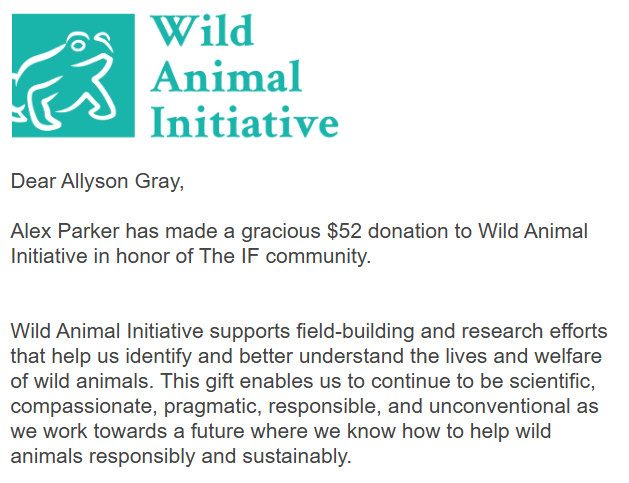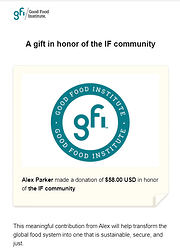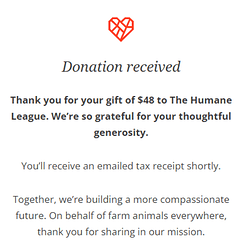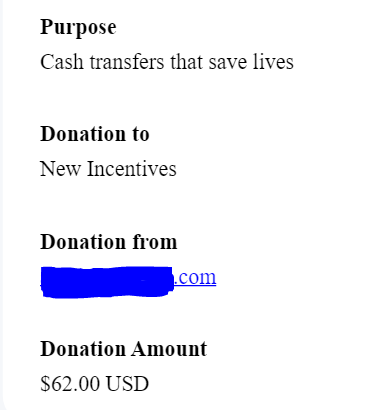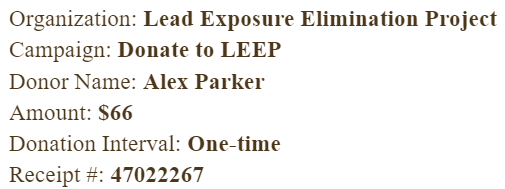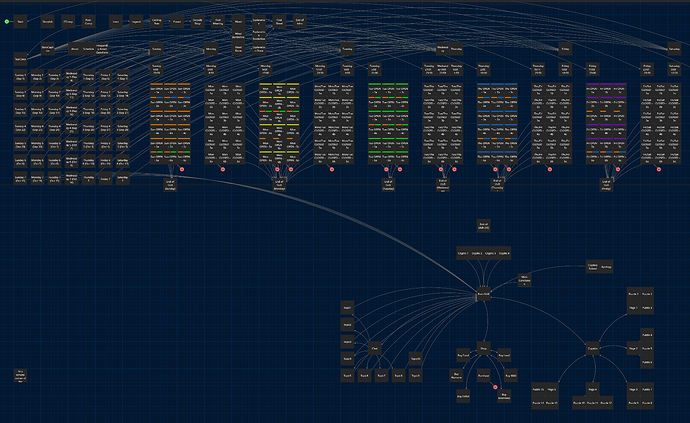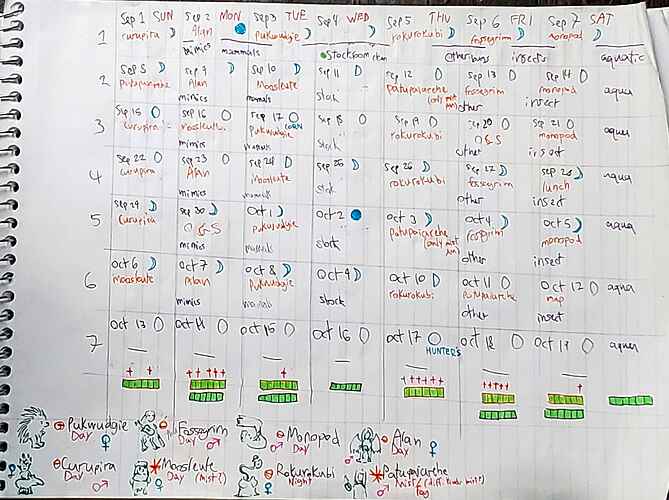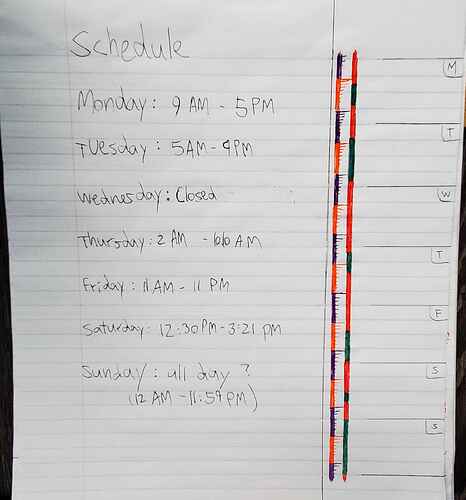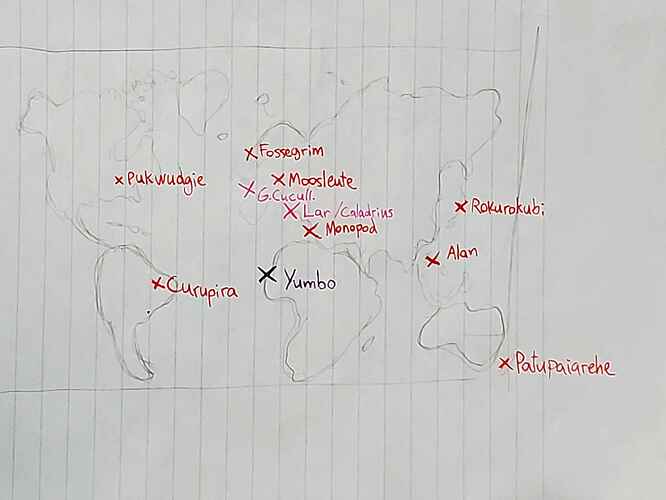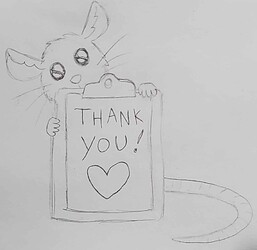Apologies for the delay! I severely underestimated how much catch-up I’d need to do after coming home from visiting family. It’s been a difficult few months for us.
I tried to cover what seemed most important in this post, and I’m always open to further questions or discussion about The Apothecary’s Assistant (or just any conversation in general). 
The end-of-comp version of the game can be downloaded on itch.io, though it’s not playable at the moment (more on the post-comp version further down). The source code in Twee form can be viewed on Github.
And this is what it all looks like in the Twine editor:
DEVELOPMENT
Origin and goals
I found out about a year ago that Twine has ways to fetch the player’s date and time, and I was very excited by that discovery. So many possibilities for immersive and interesting mechanics! I wrote down a few of them on my list of IF ideas and let them sit for a while.
As time passed after the release of Dysfluent, my list grew longer and longer. I’d already put the money from IFComp 2023 aside for donations — what if I involved players in distributing it? Maybe someday I could try making a customer service simulator? Or how about a game with cryptic crossword elements?
Some of these thoughts were slowly beginning to coalesce into a single concept.
Just a few months after IFComp, it was already time for Spring Thing, which I tentatively signed up for to make Nonverbal Communication. And as summer approached, I felt emboldened to try something more ambitious. Something that would be tailor-made for IFComp 2024.
So I set out to write an experimental low-stakes game that could be played in-between other entries, and would hopefully send out a bit of positivity into the world.
Design questions and challenges
A whole slew of technical and design challenges came up during development! Alex’s help was invaluable in overcoming many of the former; without him, there’s no way I would have been able to fully execute my vision. Below are just some of the questions and difficulties that stood out.
Technical:
- How do we help players preserve their save data over multiple days or weeks?
- How do we implement the sunset/sunrise and the dark/light modes?
- How can the clock be programmed to update itself every minute?
- How can the special text fields be implemented (cryptic clues, mad libs)?
- How can some of the passage transitions be automated? (I was prepared to manually enter every passage name, but I was impressed by Alex’s ability to “work smarter”!)
Lore and characters:
- What kind of folkloric creatures should I choose? How can I represent a variety of cultures? How can I integrate elements of the original myths while still making the characters my own?
- How and where can I find authentic names for the characters, especially from cultures with a limited modern presence (e.g. indigenous tribes)?
- How can I make all these characters sound distinct from each other?
- How do I explain the particularities of this magical world without making it boring or confusing?
- How can the time limit be justified in-game? How can I bring the Hunter’s Moon into it even though it falls right outside the comp?
Design and player experience:
- How can the story be made interesting enough without triggering FOMO (fear of missing out)? How can I create an environment where folks are comfortable playing as little or as much as they feel like, on whatever days suit them best?
- How should I set a minimum recommended playtime, and how do I write a satisfying mini-conclusion?
- How can I make sure that players have a good experience regardless of when IFComp starts and ends in their time zone? How should I handle the days at the beginning and end of that period?
- How long should each shift be and how can I make all of them feel distinct and satisfying? When should I cut the shifts off? How do I prevent the scope of the game from ballooning to unmanageable levels with over 70 shifts to fill?
- How can I create character progression and special scenes over repeat visits, but also make each individual shift feel complete?
- What kind of store schedule would give players the opportunity to explore open or closed shifts regardless of their real-world commitments?
- How do I clearly communicate to players so that they’re not caught off-guard by changes in the game state? How do I cultivate a mysterious and intriguing atmosphere without making gameplay elements obscure or confusing?
And the question that soon overtook everything:
- We’re running out of time! What do I cut out?!
I feel like we did a decent job tackling obstacles overall, but a lot of the solutions were definitely imperfect, and the time crunch was responsible for a lot of cut content (as well as cut corners).
There is a long list of things that were planned but never made it in, including:
- A greater significance to the different moon phases
- More detailed and descriptive scenes
- Slightly more interconnected shifts
- A lot more chat options for Aïssatou
- A journal for the player to take notes in
- Incorporating more of the characters’ native languages
- An in-game calendar to visualize the schedule and the shifts you’ve worked
- More in-game changes and events linked to bead count
- Some kind of hint system
- Small random events happening outside the shifts
I’m hoping to reintroduce at least some of the cut elements into the post-comp version, but I don’t want to be too ambitious!
Development notes and sketches
For the curious, here are some of my planning and reference scribbles!
This was my main document throughout the development process, where I tried to fit everything into the calendar. Note the 6 regular and 2 irregular customers at the bottom (though the drawings are not fully accurate to their in-game appearances) — not pictured are the trio of special visitors or Aïssatou and Diégane.
Full list of folkloric characters and their species
Apothecary: Aïssatou (Yumbo)
Monday regular: Minviluz (Alan)
Tuesday regular: Weetamoo (Pukwudgie)
Thursday regular: Matsu (Rokurokubi)
Friday regular: Åsmund (Fossegrim)
Saturday regular: Echekrates (Monopod)
Sunday regular: Kauê (Curupira)
Irregular customer 1: Irmgard (Moosleute)
Irregular customer 2: Hau-tōrua (Patupaiarehe)
Special visitor 1: Suādurīx (Genius Cucullatus)
Special visitor 2: Ovidia (Lar)
Special visitor 3: Valens (Caladrius)
The main purpose of this chart was to figure out where shifts fell within the day/night cycle that I had decided on. The plan was for closing shifts to offer different creatures or even mechanics depending on time of day, but that didn’t pan out!
The (very poorly-drawn) world map I filled out as I picked out different folkloric creatures.
The two photos I combined to create the cover art!
RECEPTION AND IMPACT
What worked well?
- The cozy and wholesome elements brought some warmth to players, which I’m very happy about.
- The game managed to spark some interesting, insightful and sometimes hilarious discussions involving many members of our lovely community.
- We shared the love of cryptic crosswords!
- The charity portion was about as successful as I hoped, and I’m proud of the real-world good that came out of the entry as well as the money-raising games that preceded it.
- Diégane the rat was unexpectedly popular!
- Despite the game’s shortcomings, it seems the format and structure worked as intended overall and most players were able to enjoy it for as long as they were interested in playing. And some players kept coming back for much longer than the recommended minimum, which was very cool to see!
What missed the mark?
- We had a technical mishap right before submitting, which caused the release version to have a few outdated scenes and features. I tried to correct it as soon as the comp opened (and we then made small changes all throughout September to fix other bugs and improve playability), but I’m very sorry to anyone who ran into issues!
- The “amnesia effect” seems to be the game’s biggest downfall by far — the lack of recurring descriptions or in-game notes made it difficult for players to remember characters and story elements.
This is a problem we couldn’t easily identify in the testing stage, as recruiting people to test the game in real time over a 6-week period would have seemed too impractical and demanding even if we hadn’t been under such heavy time pressure. In the end I just did my best to test the game myself alongside Alex (who is always a wonderful tester and can provide a fresh pair of eyes due to not being involved in the design/writing process), and we largely used methods that let us quickly skip between shifts. This condensed testing phase caused issues, notably because it made me too sensitive to repetition as I edited the text. The addition of a journal feature is a very high priority for the post-comp version and I’m hoping it’ll help!
- The cut content could definitely be noticed in places! Some players unfortunately felt the impact of missing features or underdeveloped scenes.
- The explanations for certain mechanics were not always clear enough, which caused confusion for some players (sorry again)! I think it should be much better after the various updates, but I’ll keep looking for places where improvements could be made.
- Approximately ⅓ of IFComp voters did not purchase a bead, which in most cases probably means that they didn’t reach the ‘conclusion’ on shift 5. I’m not sure if the discrepancy falls within typical voting patterns or if it’s a failure of this game in particular!
- I think the sense of mystery I tried to cultivate during the comp ended up being a little too mysterious, and I regret not providing a bit more information about the game upfront. Combined with the amnesia effect, it created an unnecessary barrier to approaching, following or discussing the game.
Other thoughts and observations
I’ve said before that I would consider this game a success no matter how it’s ranked. And I still do! I’m so happy with what we’ve accomplished, and with the feedback overall, that after the initial surprise I wasn’t really bothered about placing lower than the predictions. Middle-of-the-pack is not a particularly low position to begin with, and considering that many of my personal favourites in this comp and the last have placed in the bottom ½ and even the bottom ¼, I feel like I’m in very good company.
But what has admittedly thrown me for a loop is the solid handful of very low scores; I’m finding it difficult to shake the feelings of shame and guilt associated with 1’s or 2’s. They especially caught me off-guard because last year’s Dysfluent, which featured an especially unpopular and divisive mechanic, was still found by all voters to have some redeeming features! This time around, I’m struggling to reconcile the pride and happiness of having made a game that was enjoyable or even inspirational to a decent number of players, with the distress of having made a game that some players completely hated.
I’m reminded of a conversation I had with @pinkunz recently, where we discussed the dynamics of competitions and similar events — more specifically, their tendency to push folks to play and/or finish works that they normally would not have engaged with. As an author, I’m worried that entering a game in IFComp is equivalent to imposing it on players… and if some players then find it offensive or otherwise very unpleasant, I feel really bad! It makes me wonder, am I doing something wrong by forcing these experiments on people? I don’t plan on turning my back on the biggest IF event in the world (and some concepts like Apothecary just wouldn’t work properly if released outside of any events), but I’d still like to ponder the question further.
In any case, these concerns about the unintentional negative impact of my work don’t overshadow all the absolutely wonderful comments and reviews from the folks who, thankfully, had a good experience with the game or just enjoyed the idea. I feel truly spoiled to be surrounded by so many thoughtful people, and it’s a huge honour to have been able to enrich their lives in some very small way! I also greatly appreciate every piece of feedback, both positive and critical.
WHAT’S NEXT?
Planned changes and improvements
There’s a lot of work required in order to make the game playable outside of the comp dates! To be honest, I haven’t decided yet which methods I’m going to use, and I’m even considering making 2 different versions (one that sticks more closely to the comp’s narrative framing device, and another that changes up the story a bit more). I have lots of workable ideas but no perfect answer!
The list of cut content and features from the development section summarizes pretty well what I’ll be focusing on, but there are a couple of additional questions and concerns:
- I really want to make a screen-reader-friendly version of the game, but I’m intimidated by the challenge of converting over 30 shifts to nonvisual mechanics in a way that’ll be interesting for players! In the short-term, I’ll at least try to explore some compromises.
- How much should I try to change the story or add to it? I don’t want anyone to be disappointed by either changes or lack of change. I’ll definitely need to make at least some adjustments to the story, but I’m not sure whether to only do the bare minimum or try to get more creative with it (hence the temptation to try to make 2 versions, though I’m not sure that’s a realistic goal).
As much as I want to give players a much more complete and polished experience in the next release, I’m trying really hard not to fall prey to perfectionism. I’m making peace with the fact that I won’t be able to make the game flawless or fit all of my ideas in, and that’s okay because otherwise I’d never be able to move on to other things (something I often struggle with). That being said, if there’s enough interest, I’m open to working on it some more in the medium-long term and possibly expanding the story.
My hope is still to finish the post-comp version by the end of the year, but I’ve been dealing with health issues and various responsibilities, and I’m realizing there’s a good chance I’ll have to postpone it. I’ll write some updates (both in-game and in other places) to reflect this, if necessary.
Player feedback
As I’ll probably have to pick and choose what to focus on in the post-comp version, I want to be receptive to player preferences. I’m already taking into account the feedback I received during the comp, but if there’s anything discussed in this post that you especially want to see, or if you have any other ideas, you can let me know and I’ll do my best to prioritize it!
On a different note: during the comp I aimed to make the voting process as low-friction and low-stress as possible, so I didn’t bring up the possibility of crediting players who purchased beads — but it’s something I would love to do! If you’re interested in having your name in the game, you can let me know by voting in the poll below.
If you select the first option, I’ll try to fetch your full name from your profile or from Hidnook’s handy reference guide from this post (the “IntFiction Reference Reference” spreadsheet), and I shouldn’t need any further input. The second option can be used for any other cases.
Poll for players who’d like to be credited
- I’ve purchased a bead and would like to be credited under my full name
- I’ve purchased a bead but I’d like to specify a different name, clarify my pseudonym, or make another request, and I will be in contact with the author
Feel free to use this Google Form (yes, another one!) to communicate your feedback and/or preferred name, if you find that more convenient:
https://forms.gle/TH7XJi6oMUYPq9EJ8
I also want to emphasize one last time that I always welcome messages! If I’ve made a mistake with your information, or if there’s anything else you think I should know or address, please don’t hesitate to let me know.
Lessons and takeaways
Several of my takeaways from this experience are really just continuations and reinforcements of what I’ve been learning over the past year of releasing games:
- Don’t take criticism personally and keep everything in perspective
- Pay enough attention to negative feedback to improve your work, but not so much that you’re sustaining emotional damage
- Prioritize elements that are essential to the play experience and focus on keeping the project’s scope manageable
- Work smarter, not harder (when possible)
- Novel concepts can work really well if they’re done right
- Games can be used to help make the real world a slightly better place
Along with some that have become bigger concerns after this comp in particular:
- Try to give more information upfront to help people decide if they want to engage with your work
- Consider releasing more games outside of large events
- Be as explicit as possible when introducing new mechanics and don’t make assumptions about player behaviour or knowledge
- Take risks and experiment, but try to be smart about it to mitigate any negative impact to players
And that’s it, for now!
I feel very fortunate to be part of this community and to exchange art and thoughts with all of you, and I hope to continue doing it for a long time.
On a global scale, we’ve witnessed a particularly disheartening string of awful events over the past 5 years or so. The world is still filled with suffering, hatred, division and fear. I know it’s not much but I want to keep doing what little I can as an individual — whether it’s spreading knowledge and awareness, directing funds to good causes, or even just bringing people a bit of comfort, joy and inspiration. I believe in our ability to keep growing and healing together, through art or otherwise!
Sending lots of love to everyone!
![]() I wish I could share some treats with you all!
I wish I could share some treats with you all! ![]()
![]()
![]()
![]()
